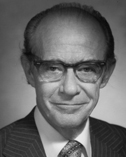

D. Mark Hegsted
Harvard University
March 25, 1914 - June 16, 2009
|
Scientific Discipline: Animal, Nutritional, and Applied Microbial Sciences Membership Type:
Member
(elected 1973)
|
David Mark Hegsted was one of the most productive and influential nutrition scientists of the late 20th century. Notable for his critical and questioning approach to nutrition issues, he spoke out strongly against concepts, whether new or established, that he believed were not supported by sufficient evidence. Hegsted also made numerous contributions to various aspects of nutrition; his experimental work covered nearly all of the major questions of his time that related diet to health.
Born on a small farm near Rexburg, Idaho, Hegsted graduated from the University of Idaho in 1936 with a bachelor’s degree in agricultural chemistry. He earned an MS in 1938 and a PhD in 1940 from the University of Wisconsin’s Department of Nutrition. After working for a brief period as a research chemist at Abbott Laboratories, in 1943 he joined the new Department of Nutrition at the Harvard School of Public Health, where he spent most of the rest of his career researching and teaching. Hegsted’s intellectual rigor and independence were reflected, for example, in his studies of dietary requirements for protein, calcium, and iron. But he was perhaps best known for his investigations of the relationship between different dietary fats—saturated, polyunsaturated, and monounsaturated fatty acids—and blood cholesterol.
An author or coauthor of more than 400 scientific publications, Hegsted served on numerous journals’ editorial boards, and his professional activities included a long record of public service both foreign and domestic.

